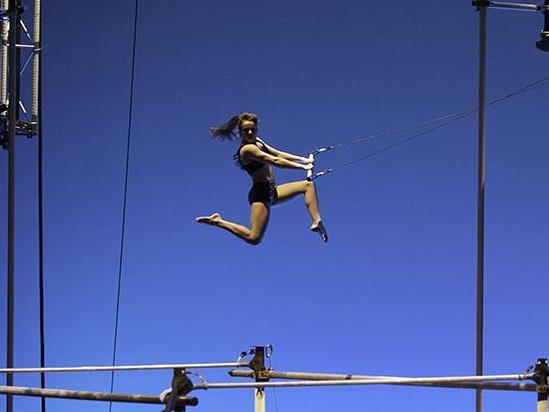NICA, 2014 Graduate Mia Albers performing in One False Move. Photo by Aaron Walker.
The road from graduating student to arts professional is not often an easy path to navigate, with fears that a qualification alone does not necessarily guarantee a job by graduation. We asked some of Australia’s leading tertiary arts institutions for their tips on making the ride from student to hired professional a little less bumpy.
1. Work while you study
Whether interning during a course or training at a school that has direct connections to the industry, some courses offer employment through the institution – and sometimes even at the institution. Senior students can sometimes tutor more junior levels or in casual and short courses.
National Institute of Circus Arts (NICA) graduate and CircaNICA artist Ella Horner said that work at NICA had led to additional work outside the institution.
‘For me, I started working at NICA when I was still a student there in the short course program, which was a really great opportunity and a really great job to have. CircaNICA is one of the leading agencies for circus so I get a lot of work through CircaNICA,’ said Horner.
‘I certainly wouldn’t have those ties to those people and those sectors if I hadn’t had done the program’.
2. Use career advice where you study
Taking advantage of the expertise offered within the academic staff when learning can be a vital component of getting hired post-studies. Head of Digital Design at JMC Academy Rahul Nath said that he urges students to approach him with career advice and to tell him where they aspire to work so he can make industry connections early on.
‘I tell all the students that enter the course that they need to be telling me throughout their studies ‘I like that agency, I like what those guys are doing’, as I can start building a relationship with that agency,’ said Nath. ‘That will start developing their connection with the company they want to work for’.
3. Learn to nail the interview
As one of the most important skills to master when trying to find a job, Senior Educator at Box Hill Institute Ben Fitzgerald, said that nailing the interview is crucial and techniques for a successful interview can draw upon experiences applying for tertiary qualifications.
‘Applying to get into a course is really very similar to a job interview in that it is a good idea to sit down and have a think about the questions you are very likely to be asked when you apply, and it’s surprising how many people don’t do that,’ said Fitzgerald. ‘You want to be thinking of things like: What do you already know about the industry? What have you already done in the industry?’.
4. Make the first move
Amid the many students vying for employment after graduation, it can be helpful to have a proactive mindset to separate yourself from the competition. Horner from NICA said that in the case of trying to move from study to career, a person has to be forthright in their approach.
‘Honestly, the biggest thing is being proactive. You’ve got to be really proactive in your communication with where ever it is you want to work. Whether it’s on a cruise ship or for Cirque du Soleil, or in a smaller company. You have to get in contact with them, you have to have all yours portfolio ready to go as soon as someone asks for it’, said Horner.
5. Be prepared to work your way up the ranks
Top positions are rarely offered to study-leavers and Vocational Education & Training Manager at Open Channel Daniel Schultheis, said that recent graduates need to pay their dues and accept that they may be starting at the bottom of the professional ladder.
‘A big mistake a lot of people make is to think that they can walk start into the top job as a director or a cinematographer. The professional industry is still quite hierarchical, so understanding what the roles are and how you might fit in is important,’ said Schultheis.
6. Embrace new experiences
Being open to new experiences is a vital component of the job hunt. Lecturer at the Actors College of Theatre & Television Ryan Tate said that after studying for a number of years, a rut can take form, whereby a student becomes settled in a certain mode of operating, however it’s best to be adaptive to new ways and modes of learning and creating.
‘Be friendly, be open to new ideas, new concepts when it comes to working in a new environment. Different shows work different ways, whether it’s musical theatre or fringe or Sydney theatre,’ said Tate. ‘If new training comes up in terms of new technology, especially in theatre there is always someone coming up with a new program or new software, it’s totally relevant to what you want to do. Being open to trying new ideas always helps’.
7. Network with fellow students
Each year’s intake of students studying at an institution have not only the shared experience but shared aspirations. Fitzgerald said that fellow students while studying will become paramount to a person’s career in the arts, saying that the wider the network of people, the more career opportunities may unfold.
‘While they are in a situation of study they’ve got a very wide range of opportunities particularly if you think of compositional performance – they could put together an ensemble of a wide variety, size and shape. The minute they leave that institution, typically their circle falls from over 100 to seven or eight. So they really want to be taking opportunities while they are in the institution to network and to try things out, because they can, and because those opportunities narrow quickly,’ said Fitzgerald.
‘People they studied with are often the people they are networking and working with 10-15 years later. So, you really are making a network that’s going to stay with you for a long long time’.
8. Build your personal brand online
Just like any other industry, the need to sell and promote yourself is vital when being considered for a position, Schultheis said that individual branding is now easier and more important then ever before with the inclusion of the web.
The internet is a great advantage to a creative person as it allows you to build your brand before you go and sell it, said Schultheis. ‘You have the technology now to be making content, to be building an audience and to be showing that you have an audience. Basically there are no barriers anymore to being able to do that, there are no gatekeepers,’ said Schultheis.
‘Make yourself marketable, by working out what it is that you have to offer that other people don’t’.
9. Go back to school to upskill or learn a speciality
NIDA Open Course Manager Rhea Walker said that sometimes the best option post-graduation is to go back to school, whether to upskill or learn a specialty to remain competitive in the industry.
‘Keep training and be a life-long learner. Continue to try different courses and specialise in different areas. For example if they were doing straight acting and wanted to do a specialisation, they might try a master class in stanislavsky or meisner or a movement specialism,’ said Walker.
10. Create your own career
If all else fails, Director of the Master of Curating and Cultural Leadership at ANSW Art & Design Dr Lizzie Muller said that instead of waiting for the right job to come around, seek out the career you want to make for yourself.
‘Don’t wait for the perfect job because it’s actually about you creating the opportunities that you want to see happen. I think that’s the mistake that a lot of other degrees make and a lot of students make, to think that the degree will prepare for a job that will miraculously appear when they graduate,’ said Muller.
‘That may well happen but you can’t wait for that to happen, you need to be creating a career for yourself and a practice for yourself which might involve independently organising something, applying for funding, writing articles in magazine or curating something in an artists space’.





